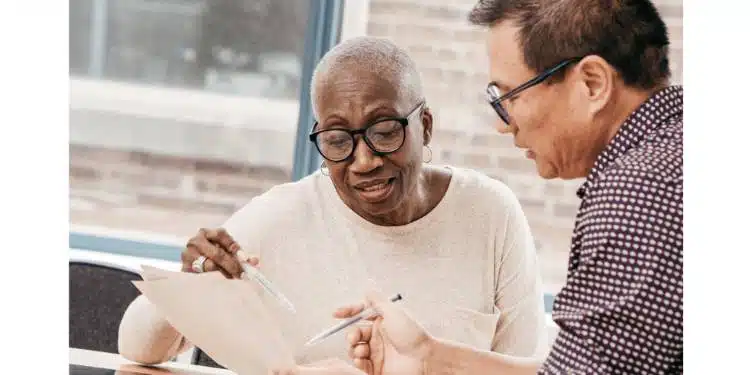by Elisa Reiter, Family Law Attorney – Underwood Perkins, P.C.
Coping with a loss involves more than just a last will and testament. Kubler Ross teaches us there are five stages to grief:
Denial.
Anger.
Bargaining.
Depression.
Acceptance.
It seems unfair that a multitude of bureaucratic items needing attention after a death can get in the way of our grieving. The list of details is overwhelming at a time that’s already very stressful. That’s frequently true even if your loved one has a Last Will and Testament, and often family caregivers find that there are no estate plans in place at all. How do you know what your loved one wanted? How do you prevent family members from fighting over possessions?
End of life conversations are a necessity; timing is unique to each case. My Bubbie (Yiddish for grandmother), of blessed memory, used to point to various tchotchkes (knickknacks) in the house when company visited and say things like “You’ve always liked the Waterford vase, it has your name on it, some day it will be yours.” When she passed, and family and friends came to pay their respects during her shiva (mourning period), more than one friend and extended family picked up the same tchotchke to see if there was a label bearing their name under that item. Not everything comes with a label when it comes to processing an estate.
There is far more to planning as to how to distribute your estate than a Last Will and Testament. The conversation should begin long before a loved one passes.
Get organized
This article does not focus on your estate planning, but rather on some nuances you may not have considered. But where to start when a loved one passes away? Create a notebook devoted to who you talked to, when, and how you can reach that person. Here are some pointers to bear in mind as you deal with the bureaucratic morass following the death of a loved one:
Power of Attorney
Power of Attorney is valid during the Decedent’s lifetime and can no longer be invoked once the maker dies. You may have acted as the Decedent’s agent or attorney-in-fact during the individual’s lifetime, but that power evaporates with their death.
Phones and Other Accounts
Often, charges are on auto-pay. If you are not a signatory on a person’s bank account, or on their phone account, the Decedent may continue to incur monthly charges for iPhones, iPads and related items. If such charges are on auto-pay, it is helpful to have the accounts tied to a bank account that is styled as a “POD” or Payable On Death account. That way, the survivor has resources to pay bills, and hopefully, means to terminate services. It is also helpful to create an Xcel spreadsheet of creditors, account numbers and passwords to begin the process of terminating services and cutting off the flow of auto charges.
Specific Bequests
Grandfather may have promised his 14K gold cufflinks to his son-in-law; Grandfather may also have detailed specific bequests in a Last Will and Testament. What if the promises and the document contradict one another? The written document prevails. What if those items are no longer accessible? What if the items are of nominal value? Some probate courts mandate that the person seeking to administer the estate obtain appraisals for all items. Perhaps items of sentiment should be addressed in a separate document, rather than as a specific bequest in a Last Will and Testament.
Credit Card Statements
To process final debts of the estate, you will need hard copies of credit card statements. However, most credit card companies freeze accounts once notified of the death of the account holder – and such notices are often promptly provided by the Social Security Administration. You may need to contact the credit card companies “Deceased Management Team” for copies of statements of account. You can submit a certified copy of the Decedent’s Death Certificate, or of a published obituary, as proof of death.
Death Certificates
Typically, it takes up to several weeks for a Death Certificate to be issued, and more time to obtain certified copies of the Death Certificate. Out of an abundance of caution, depending on the factors involved, you might want to obtain 6-12 certified copies. Why so many? You will need copies to process claims for insurance benefits, probate a Will, apply for a determination of heirship, process pension claims, close credit cards, et cerera. One copy is unlikely to suffice when a loved one passes away.
Other Records
Work with your loved one to assure that you have certified copies of birth certificates, marriage licenses, divorce decrees, Qualified Domestic Relations Orders, life insurance policies, trust documents, leases, deeds and stock grants.
Retain Counsel
Estate planning and probate are complicated areas. Retain counsel to help with the process.
Patience
Processing an estate is not an overnight task. Patience is required.
Understanding That Preplanning Is a Gift
On a personal note, I too experienced loss and such bureaucracy in my life. My mother, of blessed memory, had strong feelings about cremation versus formal burial. She wanted to be cremated. While I’ve dealt with estates for many years as an attorney, when it came to my mother’s death I lost sight of the fact that it can take weeks for a physician via a hospice service to provide a medical certificate of death. Weeks elapsed between her death and receipt of the Medical Certificate of Death. She could not be cremated until the mortuary received that Medical Certificate of Death. Mom aspired to cremation to expedite the process of “from dust to dust”, and instead was “on ice” for weeks pending completion of that certificate. She would have hated that.
Modern technology helps but does not assure good records were maintained, nor that such records are easily procured. Dealing with such issues can be overwhelming at the time when a loved one passes away. Help them help you to ease the passage by having a conversation before it’s too late. Preplanning is a gift.
About the author:

Elisa Reiter is an attorney, Board Certified in Family Law and in Child Welfare Law with the Texas Board of Legal Specialization. Mrs. Reiter is a Senior Attorney with Underwood Perkins, P.C. in Dallas, Texas. Her full bio is available at www.underwoodperkins.com. She is a prolific writer; many of her articles can be accessed at www.ResearchGate.net.
Also by Elisa Reiter on 50Plus-Today.com: What is Gray Divorce and Why is It Different?
originally posted on November 23, 2022
updated June 10, 2023










